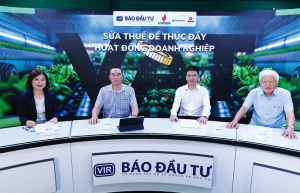Feedback welcomed for upcoming tax law changes
In 2025, we will be in the implementation stage of the amended law on VAT following the approval of the National Assembly on the draft laws, which will be discussed and passed at the eighth session taking place in October 2024.
The draft law on VAT is reported to have many notable new points such as goods and services not subject to the VAT, tax rates, conditions for VAT credit, and cases eligible for VAT refund.
 |
| Valerie Teo, tax partner Grant Thornton Vietnam (left) and Nghiem Xuan Hong An tax senior manager Grant Thornton Vietnam |
Among the amendments, the first controversial point which has received a lot of feedback is that the draft VAT law significantly narrows the list of exported services subject to the VAT at zero per cent. This issue has received many opposing comments from organisations and enterprises.
According to the draft VAT law, only three groups of “exported services” will be entitled to the VAT at zero per cent including rental of vehicles used outside Vietnam’s territory; international transportation services; and aviation and maritime services supplied directly for international transportation.
Importantly, this means the local suppliers providing goods and services for non-tariff zones and export processing enterprises (EPEs) have to issue invoices with a VAT rate of 10 or 8 per cent, and the EPEs need to record the input VAT as an expense as they cannot record creditable input VAT for declaration and refund.
This amendment in the draft VAT law will significantly impact the EPEs’ cash flow, increase their selling prices of products, and as a result, affect their profit margin and the competitiveness of Vietnam’s exported goods.
Another notable amendment proposed in this law is the threshold of annual revenue earned by business households and individuals exempt from the VAT, increasing from $3,933 to $5,899.
It is observed that the consumer price index (CPI) has increased significantly since the initial VAT law was issued; the increase in the aforementioned threshold to reflect the CPI is necessary and supportive for business households and individuals in the current economic situation after the pandemic.
However, there are still opinions that such a threshold is not sufficient. Although it is higher than the personal relief of an individual taxpayer under personal income tax (PIT) regulations ($5,190), it is still lower than the total amount of tax relief for cases where a person has only one tax dependent ($7,250).
Therefore, life would be difficult for a business household/individual with an annual income of $5,900 who has to support his entire family but has to pay the PIT on such a modest income. Some officers and taxpayers have proposed increasing the threshold to between $7,080 and $7,866.
Despite the advantageous points of the draft amended laws, it has also revealed several shortcomings and limitations, specifically in the current and upcoming socioeconomic development context.
Particularly, EPEs and companies engaged in export activities, which have brought significant foreign currency into the country and promoted Vietnam’s import-export turnover, are negatively affected.
Therefore, it is suggested that enterprises’ feedback and recommendations should be thoroughly considered by the National Assembly (NA) before the approval of this draft VAT law in the upcoming eight session in November 2024. Otherwise, there could be difficulties in the implementation phase when the draft law comes into effect in early 2025, consequently reducing Vietnam’s attractiveness to foreign investors.
In June, the Government Electronic Information Portal announced the draft amended law on CIT and SST according to the 2025 Law and Ordinance Development Programme. The portal is open to collect comments from enterprises on the said laws before they are discussed and passed by the National Assembly at the ninth session scheduled for May 2025.
Among the proposed amendments to the draft CIT law, the major change relates to the basis of taxation on capital transfer for foreign corporate investors. Foreign corporate investors having income from capital transfer in Vietnam will be subject to the CIT at a flat rate of 2 per cent on the gross sale proceeds.
While this can be considered a positive shift towards a simpler and more straightforward tax implication for foreign corporate transferors, especially for cases of indirect transfer, the proposed revisions may have a significant influence on merger and acquisition (M&A) transactions involving foreign entities.
Even if the foreign capital transferor generates no capital gain from a capital transfer transaction, CIT liability will still be triggered. This means there will be additional tax liability for transactions solely for internal restructuring and/or those that are executed at a loss.
The suggestion to the NA is to distinguish intra-group transactions from commercial M&A deals and re-evaluate the tax treatment on loss transactions.
Although the proposed change is still in the draft stage, foreign investors are recommended to take immediate action to properly plan for any upcoming M&A deals, including assessing current structures. More intricate structuring may be required to navigate this potential change.
Vietnam’s government has proposed to increase SST rates on alcohol and expand the taxable objects to include sugary beverages and tobacco products, as part of efforts to promote a healthier lifestyle among citizens.
This move will have a direct impact on the revenue of related businesses, potentially leading to a consequential loss in the state tax budget, but it is not likely to be reversed.
Businesses should take heed of the proposed changes for their operations and future strategy. A shift from their usual focus and moving towards new products might be necessary to meet new market demands and generate cash flow and profits.
The timeline for collecting feedback on the draft amended VAT law has ended; we will look forward to the final decision of the NA at the next session in November this year.
Meanwhile, as the Government Electronic Information Portal is still open to welcome feedback from taxpayers on the draft amended laws on CIT and SST, enterprises and organisations are urged to voice their many opinions on the proposed amendments and be prepared with efficient tax planning to adapt to these various changes.
 | Appying VAT on fertiliser for sustainable development Applying VAT at 5 per cent on fertiliser will benefit various parties and contribute to the sustainable development of the industry. |
 | Businesses anticipate green light for fertiliser VAT switch Domestic fertiliser producers will have opportunities to capture market share if the proposal to apply a new VAT rate on fertiliser is approved. |
 | State budget balance needed following VAT decision Businesses in Vietnam will continue to enjoy an 8 per cent VAT rate until the year’s end following an extension to the rate cut, which will cause a decrease in state budget revenues. |
 | Lawmakers study VAT implications Some have argued that the National Assembly should increase the existing common VAT rate to swell the state budget, but many enterprises are suffering from lingering difficulties |
What the stars mean:
★ Poor ★ ★ Promising ★★★ Good ★★★★ Very good ★★★★★ Exceptional
Related Contents
Latest News
More News
- Citi economists project robust Vietnam economic growth in 2026 (February 14, 2026 | 18:00)
- Sustaining high growth must be balanced in stable manner (February 14, 2026 | 09:00)
- From 5G to 6G: how AI is shaping Vietnam’s path to digital leadership (February 13, 2026 | 10:59)
- Cooperation must align with Vietnam’s long-term ambitions (February 13, 2026 | 09:00)
- Need-to-know aspects ahead of AI law (February 13, 2026 | 08:00)
- Legalities to early operations for Vietnam’s IFC (February 11, 2026 | 12:17)
- Foreign-language trademarks gain traction in Vietnam (February 06, 2026 | 09:26)
- Offshore structuring and the Singapore holding route (February 02, 2026 | 10:39)
- Vietnam enters new development era: Russian scholar (January 25, 2026 | 10:08)
- 14th National Party Congress marks new era, expands Vietnam’s global role: Australian scholar (January 25, 2026 | 09:54)

 Tag:
Tag:



















 Mobile Version
Mobile Version